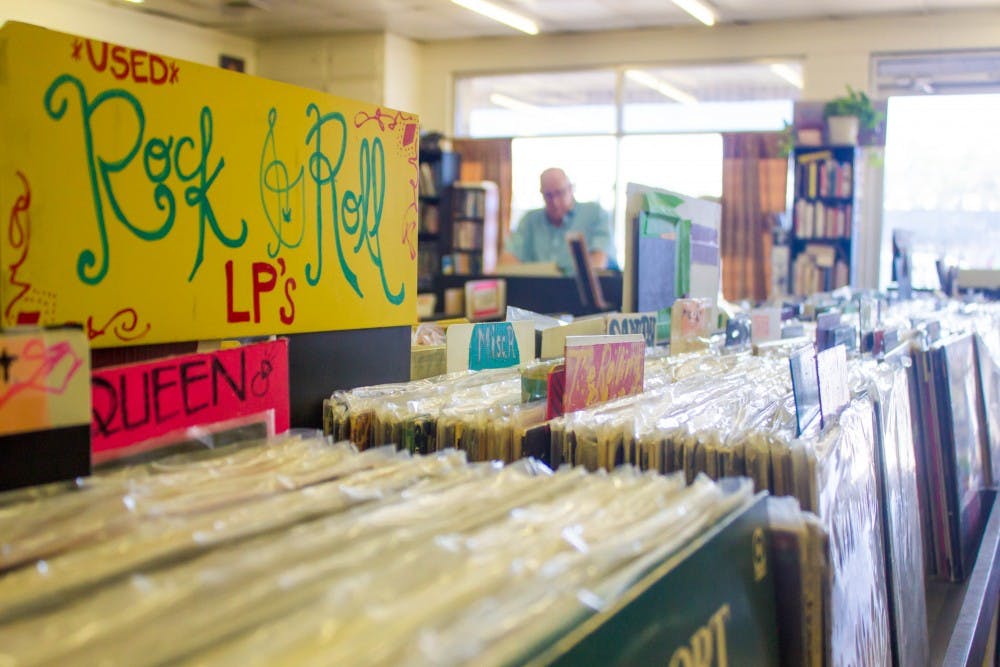The tables are turning — or at least the turntables are. Record stores across the Valley are gearing up for die-hard vinyl fans to pack their stores April 21 for Record Store Day.
The holiday is officially recognized by several major cities, celebrated by stores worldwide and serves as a testament to the resurgence of vinyl records.
Darren Skarecky, a third generation Sun Devil and owner of Grace Records in Gilbert, Arizona, decided to open his record store in December after receiving positive feedback from his father, a long time record collector, and 17-year old daughter.
Skarecky said 13 to 30-year olds frequent Grace Records the most.
“What we have seen is a resurgence in the younger generation,” Skarecky said. “It is that generation that is creating an increased demand and greater appreciation for vinyl.”
Grace Records will be among the many independent record stores across the Valley celebrating Record Store Day. The celebration was conceived at a gathering of independent record store owners and employees in 2007, with the inaugural Record Store Day taking place the next year.
Grace Records will have sales on turntables and other merchandise in addition to live music throughout the day.
“We are really just trying to have a big vinyl party,” Skarecky said.
There will also be special release albums at all Record Day participating stores.
According to a Nielsen’s Year-End report released in January 2017, Vinyl LP sales reached 13 million units in 2016, a record-high since Nielsen started keeping track in 1991.
When it comes down to it, Skarecky said the reemergence of records in popular culture is due to richer sound than digital files and a more layered musical experience.
“I think it really comes back to that appreciation for a deeper experience with the artist,” Skarecky said.
Sabine Feisst, a musicology professor at ASU, said true music lovers are fueling the resurgence of record sales.
"True music lovers treasure the record jackets and booklets and the equipment to play records, which are often beautifully designed and brimming with information," Feisst said. "They are curious and want to absorb as much about the artists and their music as possible."
Aside from their unique sonic profile, records provide listeners with a deeper experience of the music, Feisst said.
"Music is a multisensory experience and can have object character through a record and its packaging, going beyond the listening of disembodied and anonymous sounds piped into our ears via headphones," Feisst said.
It is that multisensory experience that is driving vinyl's newfound popularity.
"To me our movement away from digital media shows that might not be the most gratifying way to consume music," Feisst said.
Though the music industry as a whole grew at its fastest pace since 1997 in 2016, this surge came after the industry lost 40 percent of its revenue in the preceding 15 years, according to an International Federation of the Phonographic Industry report published in 2017.
Michael Pawlicki, the owner of The Ghost Of Eastside Records, said though the market has changed in the 30-plus years he's been selling records in the Valley, he has a consistent customer base.
"A lot of the same people have been coming in those 30 years,” he said. Despite the original Eastside records closing in 2010 and the Ghost of Eastside Records changing locations, dedicated music fans have supported the small business through the decades.
Pawlicki said his store makes most of its revenue from selling used records and added that every store needs to find its niche or specialty to draw in returning customers. He said his store has always stocked a lot of punk, hip-hop and jazz vinyl.
“It's definitely a niche thing driven by collectors,” Pawlicki said.
Record sales combined with CD and DVD sales make up 36 percent of the music industry’s revenue, according to the 2017 IFPI report, while digital sales make up 50 percent.
Mary Papenhausen, a Zia Records representative, said record stores have a unique culture that draws people in, keeping the format afloat. Zia will have several deals and special items on Record Store Day, with some proceeds going to the Boys and Girls Clubs.
“Buying your first record is like a right of passage for college kids,” Papenhausen said. “They come in and they have a good time.”
Editor's note: State Press editor Mitchell Atencio is also employed at Grace Records. He did not contribute to the reporting, writing or editing of this story.
Reach the reporters at jicazare@asu.edu and goldham@asu.edu or follow @sonic_429 and @graceoldham123 on Twitter.
Like State Press on Facebook and follow @statepress on Twitter.




